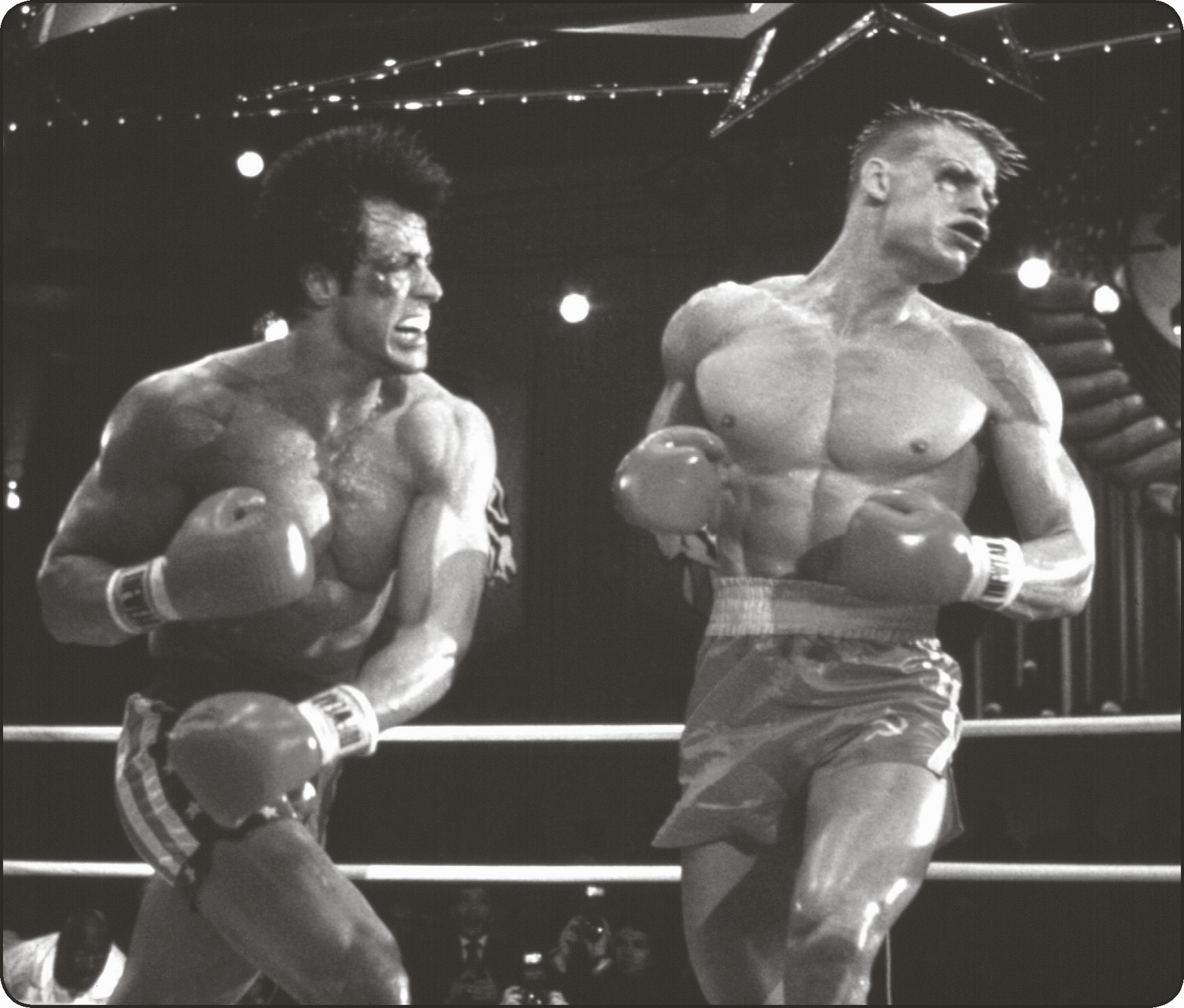CRITIC ESSAY
ROCKY IV 1985
 40%
40%
Written and directed by Sylvester Stallone
Starring Sylvester Stallone, Talia Shire, Dolph Lundgren, Burt Young, Carl Weathers, Brigitte Nielsen
In Rocky IV, Sylvester Stallone KO-ed communism in Moscow—on Christmas, no less!—but got battered by movie critics in his own country, aghast that the underdog they’d once championed all the way to an Oscar had turned into a Cold War bully. At one screening, a reviewer was alarmed to hear people in the audience get so riled up when Dolph Lundgren’s Soviet boxer Ivan Drago accidentally kills Apollo Creed in an East-versus-West exhibition match that they spontaneously began to sing Bruce Springsteen’s “Born in the USA.” (The one eighties guitar anthem not shoehorned into the movie.) Stallone, who also wrote and directed the film, does try to smooth things over. After Rocky hammers the hammer-and-sickle in the climactic fight, he delivers a pacifist speech about healing the nuclear tensions with, er, fisticuffs. “In here, we’re two guys killing each other,” he bellowed. “But I guess that’s better than twenty million.” The real-life crowd wasn’t having it. Hooted one ticket-buyer, “Yeah, but we won!”
Critics and moviegoers often square-off themselves—and this round, the audiences won. Rocky IV set a winter box office record, causing a journalist to fret that if “the Rocky saga is an indication of public opinion, it might be a good idea to check the location of the nearest fallout shelter.” Lundgren was credited with bringing back the crewcut hairstyle. And Stallone, as ever, responded to success by pretend-threatening to quit. “This is it for Rocky,” he vowed. “You take on supposedly the greatest fighting machine ever built, a biochemically produced Soviet fighter. What can you do after that? Everything subsequent is anticlimactic.”
Yeah, right. Rocky IV begat four more sequels, the most recent two of which, Creed and Creed II, wouldn’t exist if Drago hadn’t fatally clobbered Apollo. That alone is an argument for its inclusion in the pugilistic pantheon. But Rocky IV is a fascinating must-watch time capsule. It’s at once simplistic and subversive, like a boxer who’s taken so many knocks to the head that everything he says is dada-esque.
For all its jabs at cold-hearted USSR tactics, Rocky IV lands an equal number of blows on Ronald Reagan’s America. If the Soviet Union is a frozen landscape of uniformed soldiers and doctors prodding Drago like a factory-made Holstein, the United States is rotting from decadence. Now that he’s no longer breaking fingers for cash, Rocky struts around a mansion crammed with sports cars, then-state-of-the-art video cameras, and a six-foot talking robot programmed to be ex-butcher Uncle Paulie’s (Burt Young) butler and girlfriend. For these modern-day Marie Antoinettes, life is so luxurious that Rocky finds an excuse to eat two different cakes in back-to-back scenes. “Party ain’t over yet!” he grins to his wife. Sighs Adrian (Talia Shire), “It’s Wednesday?”
Ego—not Drago—kills Apollo Creed. Instead of actually training to fight an undefeated ex-military gold medalist giant who dwarfs him by four inches and forty pounds, Apollo would rather put on a razzle-dazzle show with chandeliers and showgirls and James Brown swiveling on stage. When Drago walks into the ring ready to rumble, he sees Apollo Creed setting off fireworks in front of a giant animatronic goat head. What are these crazy Americans worshipping? Drago versus Apollo isn’t even a contest. It’s over in two rounds.
Lundgren’s Drago barely speaks, except in catchphrases, most famously, “I will break you.” His wife, Ludmilla (Brigitte Nielsen), does most of the talking, perhaps because the actress herself was about to marry Stallone. Yet, while audiences left quoting her husband—my personal favorite is his almost-Buddhist koan, “If he dies, he dies”—Ludmilla has the lines people should have remembered, which she delivers at a press conference in near-tears after her family receives death threats. “We are not in politics. All I want is for my husband to be safe,” she insists. “You have this belief that this country is so very good, and we are so very bad—you have this belief that you are so fair and we are so very cruel.”
Rocky IV mangles Russian accents. It even mangles Russian geography. (When Rocky yells at Adrian that his own ego is spurring him to Moscow, he angrily gets into a car and drives, as though if he hurried, he might still make it across the Bering Strait.) But in Ludmilla’s big scene, Rocky IV holds up a mirror to Americans’ self-conception that audiences weren’t ready to see.
Now they are, and the film’s punches hit more of their targets. The film itself is structured into twin fights that stare back at each other from opposite sides of the glassy Atlantic Ocean. Two foreigners, two hostile crowds, two hometown heroes defeated, and two very different reactions.
What matters isn’t that Rocky wins—sorry to the random overexcited guy in the theater—it’s the response of the fans within the film. The Americans boo Drago when he enters, about-face and cheer him when he starts to win, and hiss when he succeeds. The Russians boo Rocky when he enters, cheer when he holds steady in certain defeat, and slow clap when he survives long enough to pound Drago to the floor. We won, sure, but they were better losers. With the Russian-American relations once again at a deep freeze, today’s audiences can have complicated feelings about Rocky IV. But like Balboa himself, it’s not as dumb as it looks.
Rotten Tomatoes’ Critics Consensus Rocky IV inflates the action to absurd heights, but it ultimately rings hollow thanks to a story that hits the same basic beats as the first three entries in the franchise.
